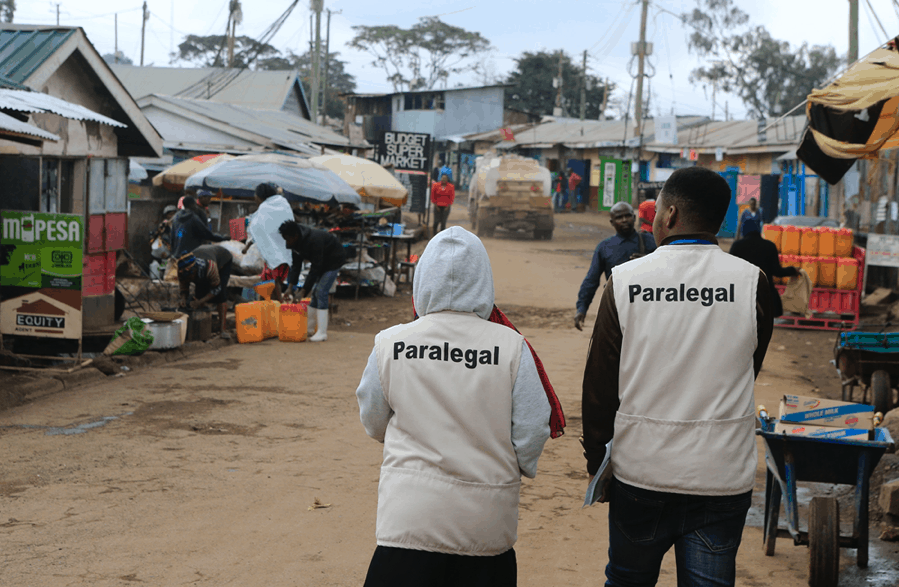By Thea Anderson and Franklyn Odhiambo, Responsible Tech, Omidyar Network
Announcing new support for Namati and Centre for African Affairs and Conflict Research in a series of local grants
The COVID-19 pandemic has accelerated efforts by governments around the world to digitize public services and public health responses. Government-issued digital ID programs are increasingly seen as a cornerstone to many COVID-19 responses, including COVID-tracing apps. Some new ID proposals — especially those that rely on digital technologies — risk amplifying pre-pandemic disparities, if clear safeguards, checks and balances, and sunset clauses are not in place.
Globally, we already see examples of enhanced ability to monitor residents using personal or community-level health data, the ability to selectively include or exclude segments of the population from government benefits, and the potential to limit one’s ability to rejoin the workforce based on personal immunity with minimal recourses in place.
At Omidyar Network, we believe that civil society and grassroots organizations play a central role in the design and implementation of any identification program. Additionally, these groups alongside independent media must engage with public policy and regulatory processes related to any proposed identification program. Nowhere is this truer than across Africa, where we see a considerable appetite for digital ID programs bolstered by the ratification of the Africa Continental Free Trade Area Agreement and the rise in the digital economy.
To positively influence the implementation of Good ID practices and safeguards, we balance collaboration between continental and regional institutions like the United Nations Economic Commission for Africa and Smart Africa alongside regional and national civil society organizations like CIPESA, Lawyers Hub Kenya, and Paradigm Initiative.
We are also pleased to announce a new grant to the legal empowerment organization Namati and a coalition of influential regional-based grassroots organizations: Haki Center, Haki na Sheria, Nubian Rights Forum, and Paranet. Namati and its partners seek to elevate the public discourse and shape public policy surrounding Kenya’s National Integrated Identity Management System (NIIMS or Huduma Namba). Over time, Namati and coalition partners have seen disparities undermine the stated purpose of the ID system as new digital technologies and related policies are added. This new grant will support Namati’s efforts to eliminate exclusion and discrimination within Kenya’s emerging digital ID system.
Namati will collaborate closely with national and local authorities to ensure adequate safeguards and accountability measures are in place during the accelerated issuance of Huduma Namba as part of the government’s emergency response to COVID-19. This grant also complements Namati’s existing partnership with Luminate, also part of The Omidyar Group.
We have also recently partnered with independent, non-partisan think tank, Centre for African Affairs and Conflict Research (CAACOR). Our grant to CAACOR will further enable the organization to lead research and offer technical assistance to policymakers on a range of issues surrounding the intersection of technology, national security, and conflict in East Africa. Several high-profile security incidents have occurred throughout the continent in the last five years, and there has been a lack of transparency on data collection and its use in counterterrorism or crime prevention. We’re concerned that while data collected to support digital ID programs could be used for legitimate national security interests, it could also entrench or establish new government monitoring and surveillance programs. Our collaboration with CAACOR will accelerate Good ID practices in several ways by:
- Ensuring research and policy recommendations balance legitimate national security interests alongside rights-based approaches with strong privacy protections that serve to support strong and credible public institutions;
- Adding a nuanced body of research on national security in Africa that begins to forecast the impacts of digital ID beyond economic growth and financial inclusion;
- Anchoring communities of practice with African experts on information security, peace and conflict studies, migration, and national security within digital ID stakeholder communities;
- Strengthening contextual evidence and the expertise base; and
- Empowering CAACOR to be a convener and coalition builder for multiple research and evidence stakeholders, including those employing varying and sometimes conflicting approaches to emerging technology discourses.
Omidyar Network’s support to CAACOR includes funding for 20 research fellowships exploring the use of identity data for national security surveillance, a convening of regional academic institutions and a landscape review of East African government’s surveillance practices linked to digital IDs. In working with regional academic institutions, CAACOR will support a multi-stakeholder and multidisciplinary approach to emerging technology policy issues in East Africa, which will no doubt increasingly include technologies deployed around the response to the COVID-19 pandemic.

